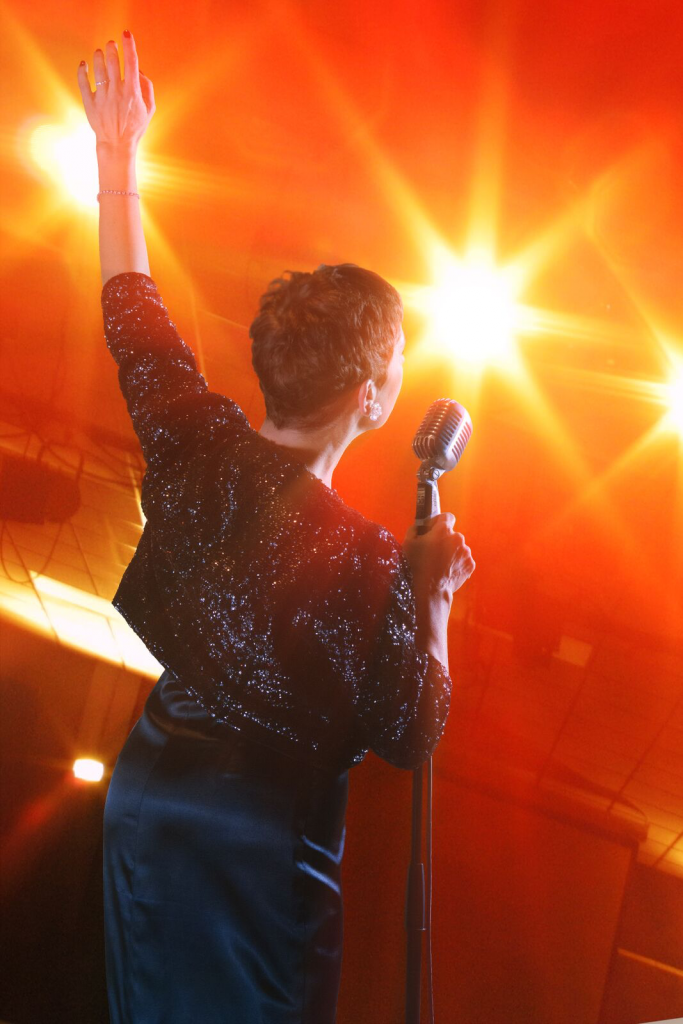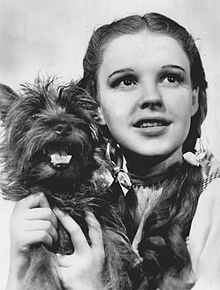
Credit: Ryan Crocker
At Jericho Arts Centre until May 20, 2017
brownpapertickets.com
Posted April 30, 2017
Everyone is unique but some are more unique than others. Judy Garland was an unforgettable, one-of-a-kind, monumental talent as well as an alcohol and drug addicted train wreck. Casting a play that is half drama, half musical (that sometimes feels like an excuse to showcase a singer) and coming up with someone to portray Garland is gutsy bordering on crazy.
But that’s the risk Claude Giroux, directing for ACE Productions, takes with End of the Rainbow, written by Peter Quilter in 2005. Giroux cast Janet Gigliotti, who shares Garland’s initials (although Garland was born Frances Ethel Gumm) and who has a whole load of talent in her own right. Gigliotti is petite (Garland was just under five feet tall) but has big pipes and she delivers more than twenty classics including The Trolley Song, For Me and My Gal, Come Rain or Come Shine, Just In Time, You Made Me Love You and, of course, Over The Rainbow. Gigliotti has an impressive resume, good acting chops and a pure, clear voice. And that might be part of the problem or maybe it’s my problem. Gigliotti is so wholesome that even as the end of End of the Rainbow approaches, she’s still just so damned healthy. Looks like she eats sensibly, doesn’t smoke or do drugs, gets a good night’s sleep every night and has a great attitude.
Garland had, apparently, an untrained voice and first appeared at the age of 2-1/2 singing Jingle Bells with her two older sisters. They were called The Gumm Sisters and performed on vaudeville stages together until 1935 at which point Judy, only 13 and now called Judy Garland, signed with Metro-Goldwyn-Mayer. Her most famous role came in 1939 as Dorothy in The Wizard of Oz. In that film she sang the iconic Over The Rainbow, a song for which she will always be identified. She was 17.
But that famous voice got smokier and huskier over the decades. She developed a vibrato so pronounced that you wondered if she was going to fall right off the note. And although in her early years she was sunny and perky and bright, she evolved into such a sad and lonely star that, to paraphrase one of her songs, “You Made Us Love You”. If you want to see a real heartbreaker, check this 1963 recording of “Old Man River” – https://www.youtube.com/watch?v=6V3OH7-Ryp0
In the video you see the famous smile that passes briefly over Garland’s face before the sad face returns; and you see the huge emotional investment she makes. While the events of her death in 1969 are shrouded it’s likely she was just, as she said many times, “sung out”. Officially, her death is recorded by the coroner as “an incautious self-overdosage” of Seconal.
Anthony Chapman, Garland’s devoted piano accompanist, is played by Gordon Roberts and as a musician he’s rock solid. As for the ‘gay’ attitude, it’s overdone.
In March of 1969, Garland married her fifth husband, nightclub manager Mickey Deans, twelve years her junior; three months later, Garland was dead. Jeffrey Hoffman, a relative newcomer to the stage, makes the best of Deans, an ambiguous character. Did he truly love Garland or was he just in it for the reflected celebrity? And did he – after refusing to let her drink or take drugs – do an about-face and contribute to her death by providing her with barbiturates?
Director Giroux also designed the beautiful art deco set that functions as both a London hotel suite and the Talk of the Town nightclub where Garland did a five-week run prior to her last concert appearance in Copenhagen. Roberts heads up the three-piece band including Matthew Simmons on bass and Colin Parker on drums.
Pleasures in this production? Janet Gigliotti. It’s just that she’s not Garland. That mold has been broken and the likes of Garland will never be seen again. In Garland’s own words, “I’ve always taken ‘The Wizard of Oz’ very seriously, you know. I believe in the idea of the rainbow. And I’ve spent my entire life trying to get over it.”



